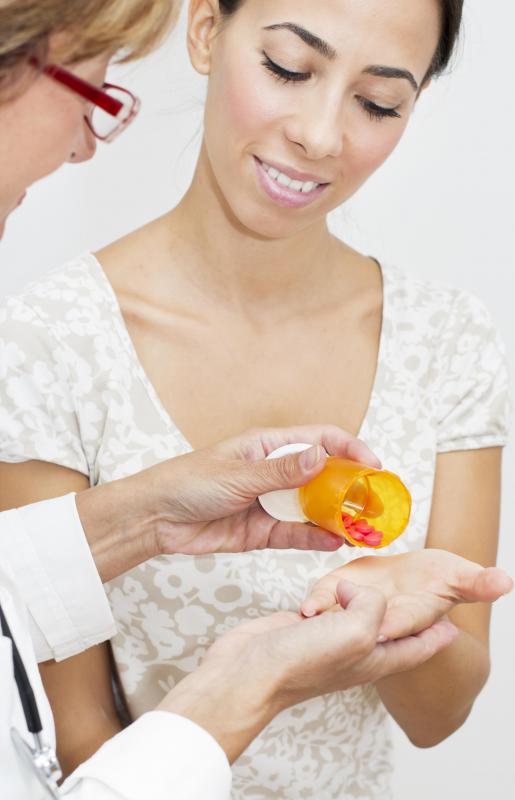At TheHealthBoard, we're committed to delivering accurate, trustworthy information. Our expert-authored content is rigorously fact-checked and sourced from credible authorities. Discover how we uphold the highest standards in providing you with reliable knowledge.
What is Antibiotic Sensitivity?
Antibiotic sensitivity is the level of susceptibility a bacterium has to a particular type of antibiotic. Antibiotics work in a number of different ways on bacterial cells, and many bacteria are more susceptible to certain antibiotics than others. By using tests in the lab to determine antibiotic sensitivity, a doctor can find the most suitable antibiotic to treat a patient, and reduce the development of antibiotic resistance in a strain of bacteria by using only one type of antibiotic in treatment, rather than several different drugs.
To perform this test, a sample is taken from a patient and then cultured to grow the bacteria in the lab. An agar plate is prepared with small tablets of various antibiotics, or strips impregnated with varying concentrations of antibiotics, and the cultured bacteria are introduced to the plate. If the bacteria are susceptible, small rings will appear around the samples of antibiotics, indicating that the bacteria cannot grow there. Often, the bacteria will have trouble growing around several samples, allowing the doctor an array of choices for treatment.

When a patient needs to be treated immediately, he or she is often given a course of antibiotics before an antibiotic sensitivity test is performed, because it may be critical to start fighting the bacteria. The test will determine whether or not those drugs are suitable, and the patient's treatment may be changed in response to the results of the test. For routine or common infections, doctors may opt to skip the susceptibility testing phase, assuming that a standard treatment will be effective.

It can be expensive to perform antibiotic sensitivity tests, and to obtain the antibiotics which are revealed as suitable for use by the testing. For this reason, the testing is usually only used when it is clearly needed. Testing in the lab is generally preferable to testing different courses of antibiotics in the patient, for a number of reasons including concerns about finding the most effective treatment, avoiding the development of antibiotic resistance, and keeping treatment costs affordable for the patient or medical clinic.

Some bacteria are infamous for developing antibiotic resistance or being very hard to treat. In cases where patients are infected with these bacteria, a doctor often recommends testing for antibiotic sensitivity to ensure that the appropriate treatment is provided. Testing can also be used to learn more about a specific infection, and to collect data about emerging outbreaks which can reveal the ways in which the bacteria spread.
AS FEATURED ON:
AS FEATURED ON:















Discussion Comments
People used to think I was a bit weird when I talked about using natural antibiotics, but these days it's becoming more popular.
Garlic is amazing for all kinds of problems, including viral, fungal and bacterial infections. I take a capsule daily and also cook with it a lot. I rarely get sick anymore, which is wonderful.
Another supplement I recommend is echinacea, as it's a natural way to boost the immune system. You do need to take them regularly, perhaps 3-4 times a day, to see the benefit.
@yumdelish - I agree with you that we can do quite simple things to try to reduce this problem. How many people abandon a course of antibiotics before they finish it? It's quite common to stop when you feel better, but this encourages the bacteria to become resistant.
I do think though that the responsibility for change should be shared with health care professionals. More funds for culture sensitivity tests, less medicines given out - especially when they are not really necessary, and encouraging people to live a healthier life would all work wonders.
I try to live a healthy lifestyle. I eat well, rarely drink, exercise regularly and avoid taking medicine unless it's very necessary.
The thought of all these antibiotic resistant bacteria strains really scares me, and I wish everyone would take a bit more personal responsibility for their health. Perhaps together we can stop this becoming an out of control problem.
Post your comments